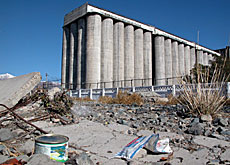Helping small business fight corruption

Small businesses in Kyrgyzstan are fighting endemic corruption and constant bureaucratic interference.
In an effort to help them, a number of Swiss aid groups are working to boost the independence of fledgling enterprises by providing advice and credit.
“Our members have long forgotten the communist mindset,” Sergei Lissunov, an adviser with the Bishkek-based Business Professional Network (BPN), told swissinfo.
“We also don’t work with businesses that benefited from the privatisation of state assets,” he added.
The BPN is an organisation devoted to helping growing firms by providing training, encouraging sound business practices and providing loans.
The network was launched in 1999 by a Christian association of Swiss business people. The programme is supported financially by the Swiss Development Corporation and is managed by the Bern-based consulting firm, Servus Business Development.
Coaching
“Although many people want to open their own business, they don’t have the necessary know-how,” Hans Willhelm, the head of Servus, told swissinfo.
Willhelm, who travels regularly to Kyrgyzstan to run workshops, says entrepreneurs in Kyrgyzstan have either learned their business theory from textbooks, or remain hamstrung by the mentality of the Soviet era centralised economy.
Anara Kerimbekova, who runs Kyrgyz Style, which exports felt carpets, is a member of the BNP programme.
“Learning all the things that need to go into a business plan was very important,” Kerimbekova said.
Her headquarters in Bishkek is a room filled with bright carpets, puppets, shoes and pillow covers, as well as more traditional items such as the Kyrgyz folk hat, the kalpak.
“We try to make both traditional and modern designs,” she said.
Assisted by a $15,000 loan from BPN, her business was able to purchase sewing machines, a computer and a digital camera. The firm currently employs 20 people and has another 80 home-based freelancers.
Kerimbekova plans to expand her business by renting a larger production hall on the outskirts of Bishkek.
Macaroni
Already set up on the outskirts of the city is Valery Magavanov, a factory owner producing around 25 tonnes of pasta for the local market.
“This mill was possible through the help of BPN,” Magavanov, who has been with the programme since 2001, told swissinfo.
Formerly based in a small room in the city, Magavanov’s mill now occupies a two-storey building.
Business appears to be thriving. The mill’s machines run at full speed, dust fills the air, and a conveyer belt spits out freshly dried macaroni. Outside, a farmer arrives with a donkey-cart laden with fresh grain for milling.
Magavanov says he has no fears about repaying the loan. The business employs 15 people, and is currently booming thanks to high prices.
Fighting corruption
The BPN project attracts more than 300 new business aspirants every year, from which a maximum of 30 are selected.
Lissunov says businesses taking part include an internet café, an advertising agency, a fruit-juice business, doctors, mechanics, textile manufacturers and a potato chip maker.
“We support over 100 businesses employing more than 2,000 people”, Lissonov said. “And that gives us a certain political clout.”
Half of the businesses have formed chamber of commerce to lobby the government, particularly against bureaucratic corruption.
“Bureaucrats love a young business, because they know they can get money from them,” Lissunov said.
Legal reform
The Bern-based Willhelm said BPN’s goal was to encourage new businesses to avoid corruption.
“We want to trigger an economic turnaround with our work [in Kyrgyzstan],” Willhelm said.
“Our project partners must behave in an anti-corrupt manner,” he added.
He says backhanders and payments to officials are a cancer that has weakened the economy ever since independence.
In any case, the lobbying efforts have already paid off. The chamber was recently invited by the central government to help it draft new corporate legislation.
swissinfo, Philippe Kropf and Jacob Greber in Bishkek
Transparency International describes Kyrgyzstan as one of the world’s most corrupt countries.
Businesses are regularly fleeced by bureaucrats, often for minor administrative “transgressions”.
As a result, many small and medium enterprises (SMEs) actively engage in tax evasion and operate within the black economy.
Swiss NGOs say they are working to reduce corruption among businesses.
SMEs in Kyrgyzstan pay interest rates of 15-30%.
Deposits are usually twice the value of the loan.
Bureaucrats often charge 10% of the loan value in “stamp duties”.
BPN provides affordable credit, to be repaid over three to five years.
The loans are financed by international business people, who contribute interest-free capital to the BPN’s loan pool.

In compliance with the JTI standards
More: SWI swissinfo.ch certified by the Journalism Trust Initiative

You can find an overview of ongoing debates with our journalists here . Please join us!
If you want to start a conversation about a topic raised in this article or want to report factual errors, email us at english@swissinfo.ch.